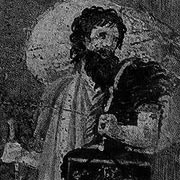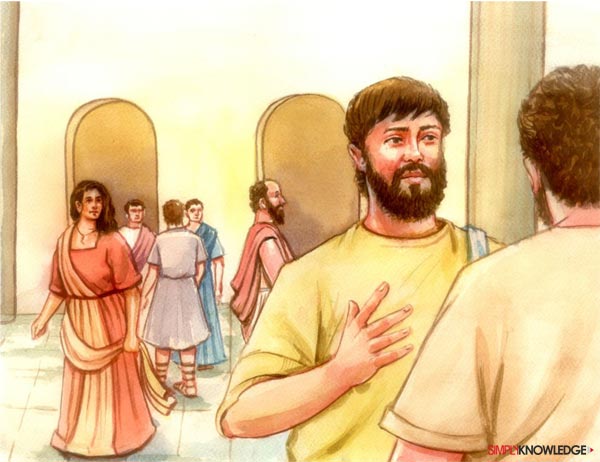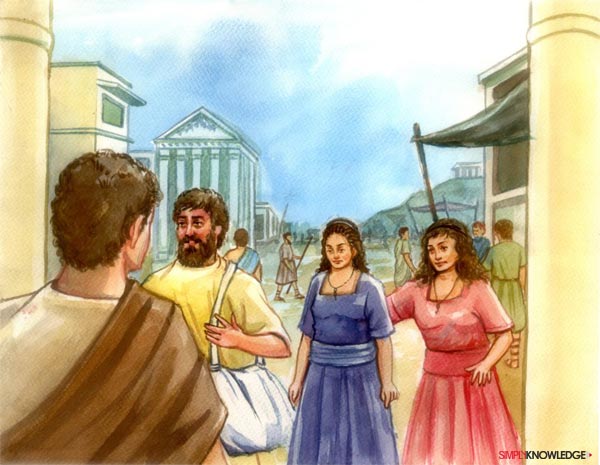



"If you choose to live our way, you will never yearn for your wealth. You will open your purse happily to give away everything without any sorrow or trembling hands. If you see your purse full, you will empty it and if you see it empty, you will not be perturbed. Because you will have both learnt to spend money as well as live without it. Instead, you will lead a content life, bereft of desires and happy with whatever you get.” This was said by Crates of Thebes, one of the greatest Cynic thinkers of ancient Greece, when a young man once questioned him about why he choose to follow him. In these few words, Crates of Thebes had aptly encapsulated the gist of living as practiced by followers of the Cynic school of thought, who flagrantly violated all accepted societal norms.
For Crates was no ordinary Cynic. Unlike other Cynics, he donated his wealth for a dog-like life as practiced pupils of school. And he is also credited as being the first Cynic to intervene between quarrelling couples to find an amicable solution to their marital discords: Because Crates is the only Cynic who is known to have married despite his self inflicted poverty.

Ancient historian and chronicler, Diogenes Laertius, in his epic ‘Life and Works of Eminent Philosophers’ records, Crates was born in a part of the Athenian empire- Thebes- now in Luxor, Egypt, in 365BC. He was the son of Ascondus, a wealthy merchant who traded between Thebes and various parts of the world.

Diogenes Laertius and other historians are unable to chronicle the life of Crates due to antiquity. He is credited with possessing immense knowledge. Paradoxically for a Cynic, Crates was urbane and suave in his mannerisms despite his Cynical leanings, indicating he was privileged to superior education during his childhood and teens. Despite his inherent wealth, Crates found his lifestyle banal and craved for a meaningful existence. This yearning explains his leanings towards Cynicism.
Historian Laertius narrates two accounts about how Crates became a follower of Cynicism: One of them states, he was touched by the plight of the mythical king Telaphus, who figures in an ancient Greek tragic drama for losing all wealth and might. Another legend claims, Crates was disgruntled with his wealthy lifestyle and exploitation of the poor, which he believed, denigrated every human virtue and hence, decided to live a life of piety and virtue as preached by the Cynics. He bequeathed all his wealth and left Thebes for Athens, clad only in a robe and a small pouch, sufficient only to carry a few coins he would require to buy bare necessities.

Romano-Grecian historian Plutarch chronicled Crates’ life but unfortunately, the work is now extinct. From surviving fragments of Plutarch’s writings and research by other chroniclers, Crates first finds mention in Athens around 330BC, as a student of Diogenes of Sinope, the irascible Cynic who snubbed emperor Alexander the Great and was described as “A Socrates gone mad,” by Plato. It is believed Crates also studied under Stilpon, a thinker from the Megarian school of thought.
Crates was a devoted student of Diogenes of Sinope but soon distinguished himself from his frenetic teacher- who vilified all he met. Crates was an antithesis of Diogenes of Sinope: Though he practiced the “dog like” lifestyle, bereft of shame and indulged in odious acts in public, Crates was suave and urbane in speech, tacitly avoiding use of profanities uttered by his teacher and peers. As a result, aristocrats and the hoi polloi welcomed Crates, regardless of his impoverished demeanour and an acquired dislike for any form of luxury.

Due to the hearty welcome accorded to him, regardless of whether by invitation or by gatecrash, Crates was blithely nicknamed ‘The Door Opener’. Crates’ demeanour was of a vivacious, highly erudite thinker and his hosts overlooked his simple robe and almost empty rucksack- a trademark of all Cynics. He would address his hosts and their guests decorously. Crates’ speeches were genial yet refined and erudite.
When quizzed by any listener, Crates would respond with vivacity unlike other thinkers, who replied haughtily and mocked others for their lack of knowledge and wisdom. It was during one of these events that Crates was attending by invitation, the turning point of his life, occurred- an event unprecedented in the field of thoughts and psychology.


Crates was attending a dinner hosted by Metrocles, one of his wealthy students, at his residence. Hipparchia of Maroneia, the sister of Metrocles, was listening to the customary debate between various thinkers that preceded the dinner. Hipparchia had heard about Crates and his teachings earlier. However, hearing his adroit yet jocund debate, the depth of his knowledge and the ability to astutely answer any questions or criticism, Hipparchia was overwhelmed and chose to marry Crates spontaneously.

Hipparchia’s proposal astonished Crates, who believed she was mocking him for his frugal, Cynic lifestyle. He responded jovially showing her his empty rucksack and old robe, asking would she marry such a person, foregoing her lavish lifestyle. To his utter surprise, Hipparchia said she would and the two were betrothed on the spot, without any due formalities. Many thinkers predicted, the marriage would be short lived, given Crates’ frugal lifestyle. Hipparchia was some 20 years younger to Crates, which further fuelled this speculation. The couple bore two children, a son and a daughter, records Diogenes Laertius.
On the contrary, Hipparchia proved to be an excellent spouse following her husband in all his teachings and forming her own thoughts, that were to lay basis for what is now termed ‘marriage counselling’ paradoxically, a highly lucrative profession, bereft of its Cynic origins of frugality.


Obscure as it is, Crates and Hipparchia would enter homes with or without invitation where any couple was witnessing marital discord for any of the myriad reasons. They would listen to the husband and the wife patiently, often themselves becoming the target of the quarrelsome couples’ fury. The duo would then patiently comfort the aggrieved husband and wife and speak about virtues, kindness, piety and other values, ending the problem finitely.
The sheer fact that Crates and Hipparchia owned nothing but yet were content living their Cynic lifestyle, respected by nobles and the proletariat and exemplified a perfect marriage in every manner, were often sufficient to convince any pugnacious couple to resolve their differences. Unfortunately, no records of techniques used by Crates and Hipparchia to counsel married couples are extant.

Since few records exist about Crates and his life, chroniclers including Diogenes Laertius are at loss to depict how he and Hipparchia spent their later years. Crates, according to various sources, died of old age in 385BC.
While Crates and Hipparchia do not attract as much attention today as a few famous thinkers, the couple were pioneers of sorts in several psychological fields related to intimate relationships between males and females.


Cynics as they were, Crates and Hipparchia often indulged publicly in physically intimate acts that are traditionally conducted indoors. When rebuked by some members of the public, Crates responded merely saying such acts were in accordance with nature adding he personally saw no reason why such intimacy cannot be enjoyed in full view of the public. He likened their act to those of animals, particularly dogs, who mate unabashedly in public since they do not obey any societal norms. The couple also tried to prove that love and affection can be displayed in public since they rank among the highest of virtues.
Crates and Hipparchia also drew flak for exposing their children to sensual pleasures at an early age: Crates allegedly forced his son, who had attained puberty, to copulate with a harlot. Crates and Hipparchia, it is claimed, allegedly encouraged their daughter into coition with several men for a month, as a “trial marriage”. They believed these experiences would help her select the right groom.
Highly controversial, unconventional and abominable as these acts may appear, they laid a crude foundation for modern day education on carnal relationships, which features as a subject in several academic curricula around the world. Present day education on this sensitive issue is however targeted at preventing deadly diseases such as AIDS and reducing the possibilities of motherhood at a minor age among girls. The subject remains controversial to date with many countries refusing to inculcate the topic in their educational curriculums.
Regardless of these controversial acts, Crates is also credited as being the first thinker to visualize and write about Utopia.

“There is a city, Pera in the wine-dark sea of folly, fair and fat, though filthy, with nothing much inside. Never does there sail to it any foolish stranger, or lewd fellow who takes delight in the rumps of whores, but it merely carries thyme and garlic, figs and loaves, things over which people do not fight or go to war, nor stand they to arms for small change or glory. Not one tower does my country have, not one roof, but for home and city, the entire Earth lies, at my disposition for a dwelling,” wrote Crates in his quatrain exemplifying what he envisioned as a Cynic Utopia.
The word ‘Pera’ in Greek, means a rucksack, a trademark of all Cynics, since it served several purposes such as carrying their meagre belongings and for use as a sleeping bag or blanket, among others uses.
Crates’ ode is the first known work of its kind to eulogize Cynicism and how Utopian the world would be if everyone lived as a Cynic. Ancient Romano-Grecian historian, Plutarch, claims that Crates’ words tacitly imply avarice is the root social problems, tyranny and other evils that plague mankind. Further in the poem, Crates extols the virtues of lupine soup, the frugal meal popularized by Cynics, to connote that a simple, virtuous life is sufficient for happiness.


“Glorious children of Memory and Olympian Zeus, Muses of Pieria, listen to my prayer!
Give me without ceasing food for my belly which has always made my life frugal and free from slavery. Make me useful to my friends, rather than agreeable.
I do not wish to amass conspicuous wealth, but only seek the wealth of the beetle or the maintenance of the ant. I do desire to possess justice and to collect riches that are easily carried, easily acquired, and are of great avail to virtue. If I may but win these, I will propitiate Hermes and the Holy Muses, not with expensive jewels, but with pious virtues.”
The poem, written by Crates of Thebes is a travesty of a famous ode penned by thinker, aristocrat and lawmaker, Solon, one of the Seven Sages of ancient Greece. Despite, these words are of immense gravity, not easily perceptible to a casual reader. The reasons: Firstly, the poem by Crates, albeit a parody, aptly synopsizes the Cynic way of life: a detachment from everything worldly and a life that believes that virtue accrued by ardently following nature as the divine force.
And second, the poem has an uncanny resemblance to The Lord’s Prayer, taught by Jesus Christ himself and enshrined in the Book of Matthew 6: 9-13 of the New Testament in the Holy Bible. The Lord’s Prayer begins with exalting God, praying for His will to be done on Earth, seeking bread for sustaining life, asking forgiveness for any wrongdoing and protection against falling prey to evil; similar to the ode written by Crates, albeit in a different way.
The similarity between the two prayers is pure coincidence: Crates was mocking an ancient Greek prayer by nobles and commoners seeking wealth. But Crates’ prayer is a clear indicator that Cynics too believed in a spiritual power and were not atheists or agnostics as wrongly believed. And the similarity between the two prayers is; they both do not seek riches from the divine power.
Biography of Crates | 0 Comments >>
0 --Comments
Leave Comment.
Your email address will not be published. Required fields are marked.

